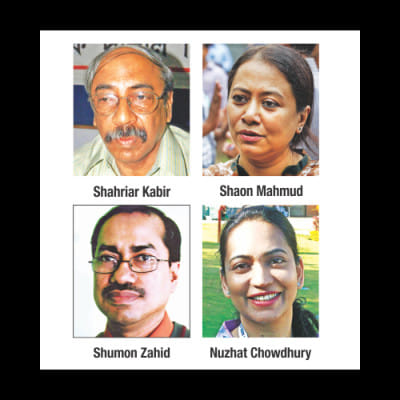Justice on the horizon

Families of the martyred intellectuals heaved a sigh of relief at the Supreme Court's decision to uphold the International War Crimes Tribunal's death sentence handed to convicted war criminal Ali Ahsan Mohammad Mojaheed. Asserting their faith in the country's legal justice system, they said the apex court had brought them one step closer to getting justice.
Shawan Mahmud, daughter of martyred music composer Altaf Mahmud, said, "This is yet another step towards our success in receiving justice. It paves the way for banning Jamaat-e-Islami."
"This verdict is a befitting reply to these criminals' outrageous claim that there were no war criminals in the country," she said, referring to Mojaheed's 2007 comment that there were no war criminals in Bangladesh.
Shawan is confident that the trial of Jamaat-e-Islami will also be held for its heinous role during the Liberation War in 1971.
"Since trial of the individuals involved in crimes
against humanity has started despite long delay, we must wait patiently for the trial of Jamaat-e-Islami."
Nuzhat Chowdhury Shampa, daughter of martyred physician Dr Alim Chowdhury, noted that the verdicts the SC delivered on three previous appeals did not have a direct link with the pro-liberation intellectuals.
"It is the first Appellate Division verdict which has given death penalty to a war criminal for the killing of intellectuals."
"Their conspiracy of killing intellectual visionaries of the country is still continuing. Therefore, it is more important to try the criminals involved in killing intellectuals in 1971, so that we can uproot the conspiracy as a whole," she said.
"As a daughter of a martyr I would like to bring it to the attention of our policy makers that if we do not try Jamaat-e-Islam and stop the ideological spread of this party and other like-minded extremist groups and break their financial and economic strongholds, I believe that our fight against the war criminals will be futile," she opined.
"It will rather only create the ground for the re-emergence of a stronger and more violent form of these extremists that will surely lead to another bloodbath in the future someday," Nuzhat stressed.
Shumon Zahid, son of martyred intellectual journalist Selina Parvin, said his family would be fully assured when the sentence was executed.
He said many members of the intellectuals' families could not see the war crimes trial taking place while they were alive.
But he wishes to see that punishment is being meted out during his lifetime. "So that we can tell our children that we received justice," he said.
Shumon opined that banning Jamaat-e-Islami "is a political decision" and noted that the party, which had committed despicable atrocities in 1971, even burned people to death to mar the trial process.
"As we learn from newspapers and other sources, no party which opposes a nation's independence is allowed to do politics in that country," he said.
Shahriar Kabir, cousin of martyred writer Prof Shahidullah Kaiser and writer and filmmaker Zahir Raihan, said, "Justice can be delayed but at the end of the day the truth will prevail."
Kabir, a journalist and researcher who was the first prosecution witness of Mojaheed's trial, said all the crimes committed by the Al-Badr was well documented in Jamaat's own publication in Selim Mansur Khalid's book 'Al-Badr', which was submitted to the court.
Shahriar criticised the law ministry for dilly-dallying with starting the trial of Jamaat-e-Islami and other organisations involved in war crimes.
"All the investigation has been done. But they have stalled the process saying that the punishment for organisations should be included in the law," Shahriar said.
"Why should it take one and half years to make this change (in the law)?" he questioned.

 For all latest news, follow The Daily Star's Google News channel.
For all latest news, follow The Daily Star's Google News channel. 



Comments